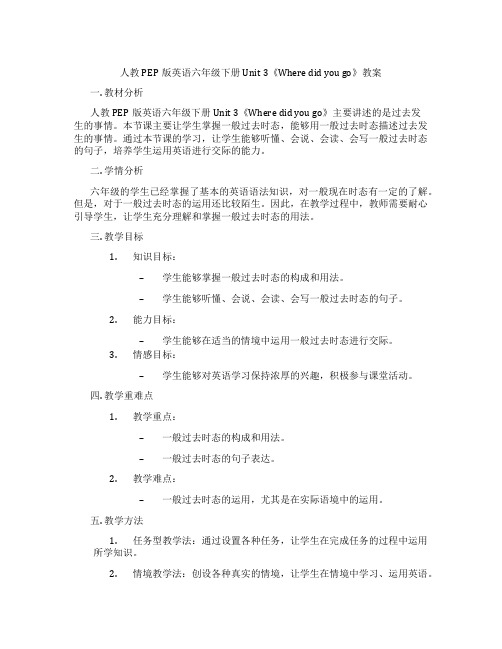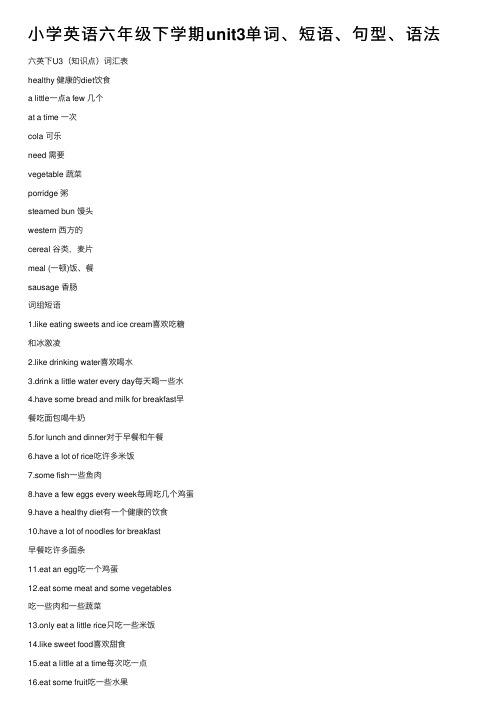六下 unit 3===6
- 格式:ppt
- 大小:98.50 KB
- 文档页数:10


人教PEP版英语六年级下册Unit 3《Where did you go》教案一. 教材分析人教PEP版英语六年级下册Unit 3《Where did you go》主要讲述的是过去发生的事情。
本节课主要让学生掌握一般过去时态,能够用一般过去时态描述过去发生的事情。
通过本节课的学习,让学生能够听懂、会说、会读、会写一般过去时态的句子,培养学生运用英语进行交际的能力。
二. 学情分析六年级的学生已经掌握了基本的英语语法知识,对一般现在时态有一定的了解。
但是,对于一般过去时态的运用还比较陌生。
因此,在教学过程中,教师需要耐心引导学生,让学生充分理解和掌握一般过去时态的用法。
三. 教学目标1.知识目标:–学生能够掌握一般过去时态的构成和用法。
–学生能够听懂、会说、会读、会写一般过去时态的句子。
2.能力目标:–学生能够在适当的情境中运用一般过去时态进行交际。
3.情感目标:–学生能够对英语学习保持浓厚的兴趣,积极参与课堂活动。
四. 教学重难点1.教学重点:–一般过去时态的构成和用法。
–一般过去时态的句子表达。
2.教学难点:–一般过去时态的运用,尤其是在实际语境中的运用。
五. 教学方法1.任务型教学法:通过设置各种任务,让学生在完成任务的过程中运用所学知识。
2.情境教学法:创设各种真实的情境,让学生在情境中学习、运用英语。
3.交际法:鼓励学生积极参与课堂交际活动,提高学生的英语交际能力。
六. 教学准备1.教师准备:–教材、教案、课件。
–与本节课相关的故事书、图片、视频等教学资源。
2.学生准备:–预习本节课的内容。
–准备一本英语故事书,用于课堂上的阅读和分享。
七. 教学过程1.导入(5分钟)–教师与学生用英语进行自由对话,复习一下之前学过的一般现在时态。
–引导学生谈论一下他们平时喜欢做的事情,激发学生的兴趣。
2.呈现(10分钟)–教师展示一张图片,图片上有一个学生在画画。
–教师问学生:“Where did he go?”,学生回答:“He went to draw pictures.”–教师引导学生注意到句子中的“went”和“drew”,解释一般过去时态的构成和用法。

六年级英语下册第三单元知识点整理六年级英语下册第三单元知识点整理unit 3 Asking the way一、单词:get到达 way路 away离开 along沿着 street大街crossing交叉路口 stop停车站 miss找不到、错过 walk路程 post office邮局 bookshop书店 shoeshop鞋店 toyshop 玩具店fruitshop水果店)run-ran跑catch-caught抓tell-told告诉kilometre千米、公里 history museum历史博物馆 city 城市 shopping centre购物中心middle school 中学primary school小学 No.=number 第…号 train station火车站bus station汽车站 road街道、路 suddenly突然steal(stole)偷 out of在…外shout大声喊叫thief小偷 bank银行 hotel宾馆p lace 地方river河二、词组:1e from 来自于…… 2.li ve in China 住在中国3.on holiday 度假4. get there 到达那里5.get to your home到你的家6.go to the city post office 去市邮局7.tell me the way to 告诉我去……的路 8.let me see 让我想想9.go along this street 沿着这条街走 10.turn right / left 向右/ 左转11.at the third crossing 在第三个十字路口 12.on your left 在你的左边13.you can’t miss it .你不要错过。
14.how far 多远15.a kilometre away 一公里远 16.a long/short walk 一段很长/短的路17.take bus No. 5 乘5路车 18.how many stops 多少站19.at the bus stop 公共汽车站 20.every five minutes 每隔五分钟21.on River Road 在大江路 22.in Shanghai Street 在上海街23.get on 上车 24.get off at the third stop 在第三个车站下车25.You’re wele. 不客气/不必谢。

⼩学英语六年级下学期unit3单词、短语、句型、语法六英下U3(知识点)词汇表healthy 健康的diet饮⾷a little⼀点a few ⼏个at a time ⼀次cola 可乐need 需要vegetable 蔬菜porridge 粥steamed bun 馒头western 西⽅的cereal ⾕类,麦⽚meal (⼀顿)饭、餐sausage ⾹肠词组短语1.like eating sweets and ice cream喜欢吃糖和冰激凌2.like drinking water喜欢喝⽔3.drink a little water every day每天喝⼀些⽔4.have some bread and milk for breakfast早餐吃⾯包喝⽜奶5.for lunch and dinner对于早餐和午餐6.have a lot of rice吃许多⽶饭7.some fish⼀些鱼⾁8.have a few eggs every week每周吃⼏个鸡蛋9.have a healthy diet有⼀个健康的饮⾷10.have a lot of noodles for breakfast早餐吃许多⾯条11.eat an egg吃⼀个鸡蛋12.eat some meat and some vegetables吃⼀些⾁和⼀些蔬菜13.only eat a little rice只吃⼀些⽶饭14.like sweet food喜欢甜⾷15.eat a little at a time每次吃⼀点16.eat some fruit吃⼀些⽔果17.in the afternoon and evening在下午和晚上18.the following words下⾯的单词19.some potatoes⼀些⼟⾖20.many tomatoes许多西红柿21.get out出去22.Chinese people中国⼈23.have some porridge喝些粥24.steamed buns馒头25.western people西⽅⼈26.have cereal and sausage for breakfast早饭吃⾕类和⾹肠27.have to go to the supermarket不得不去超市28.want to come with me想要和我⼀起来29.see some drinks看见⼀些饮料30.take a small bottle拿⼩瓶的31.drink too much cola喝太多可乐32.want this big fish想要这只⼤鱼33.need a lot of rice需要许多⽶饭34.take the big bag拿⼤包的35.go home回家36.too heavy太重37.have a rest休息38.in a healthy diet在⼀个健康的饮⾷中39.have some meat and fish in your meals在吃饭时吃些⾁和鱼40.eat only a little sweet food只吃⼀点甜⾷句型1.What do you have for breakfast? 你早饭吃什么?/doc/0380fbdd284ac850ad0242c1.html k is good for your body. ⽜奶对你的⾝体有益。

六年级下册英语第3单元English:In the sixth grade English unit 3, students will learn about different types of weather and how to discuss weather conditions. They will practice expressing their opinions on different weather types, such as sunny, cloudy, rainy, and snowy. Students will also learn how to use proper grammar and vocabulary to describe the weather accurately. Additionally, they will have the opportunity to engage in conversations with their peers about their favorite weather and why they enjoy it. Through various activities and exercises, students will develop their speaking and listening skills, as well as their ability to communicate effectively about the weather.Chinese:在六年级英语第3单元中,学生将学习不同类型的天气以及如何讨论天气状况。
他们将练习表达对不同天气类型的看法,如晴天、阴天、雨天和雪天。
学生还将学习如何使用正确的语法和词汇准确描述天气。
此外,他们将有机会与同龄人谈论他们喜欢的天气以及为什么喜欢它。
通过各种活动和练习,学生将发展他们的口语和听力技能,以及他们有效交流天气信息的能力。

6下Unit3 A healthy diet知识点整理班级姓名【词汇】1. healthy 健康的2. diet 饮食3. a little 一点4. a few 几个5. at a time 一次6. cola 可乐7. need 需要8. vegetable 蔬菜9. meat 肉10. add 增加11. remember 记住,记得12. porridge 粥13. steamed buns 馒头,蒸包14. western 西方的15. cereal 谷物;荞麦食品16. sausage 香肠【词组短语】1. a healthy diet 一份健康的饮食2. like eating sweets 喜欢吃糖3. drink water 喝水4. drink a little water 喝一点水5. every day 每天6. have some bread 吃点面包7. have a lot of rice 吃许多米饭8. some fish 一些鱼9. some meat 一些肉10. a few eggs 几个鸡蛋11. every week 每周12. a lot of noodles 许多面条13. for breakfast 作为早饭14. for lunch and dinner作为午饭和晚饭15. some vegetables 一些蔬菜16. eat a little rice 吃一点米饭17. sweet food 甜食18. at a time 一次19. some fruit 一些水果20. only a little 只有一点21. a few 几个22. a lot of 许多23. eat some cakes 吃些蛋糕24. get out 出去25. a little mouse一只小老鼠26. in her house 在她的房子里27. Chinese people 中国人28. have some porridge 吃些粥29. steamed buns 馒头30. Western people 西方人31. have cereal and sausages 吃谷物和香肠32. in the fridge 在冰箱里33. go to the supermarket 去超市34. come with me 跟我一起来35. see some drinks 看见一些饮料36. have some cola 喝些可乐37. take a small bottle 拿个小瓶38. this big fish 这条大鱼39. need rice 需要米饭40. take the big bag 拿这个大包41. too heavy 太重42. have a rest 休息一会儿43. be good for your teeth 对你的牙齿有好处44. too much cola 太多的可乐45. be good for your body对你的身体有益【语法】1. 可数名词和不可数名词名词是表示人、事物和抽象概念的词。

Unit 3 Story time①Mike likes eating sweets, cakesand ice cream. He does not like drinking water. He only drinks a little water every day. 迈克喜欢吃糖果、蛋糕和冰激凌。
他不喜欢喝水。
他每天只喝一点水。
Mike has some bread and milk for breakfast. For lunch and dinner, he has a lot of rice, some fish and some meat. He has a few eggs every week. 迈克早餐吃一些面包,喝一些牛奶。
他午餐和晚餐吃很多米饭、一些鱼和一些肉。
他每星期吃几个鸡蛋。
Does Mike have a healthy diet? 迈克的饮食健康吗?②Yang Ling often has a lot of noodles for breakfast. She sometimes eats an egg too.For lunch and dinner, she eats some meat and some vegetables. She only eats a little rice. 杨玲早餐经常吃很多面条。
她有时也吃一个鸡蛋。
她午餐和晚餐吃一些肉和一些蔬菜。
她只吃一点米饭。
Yang Ling likes sweet food too, but she eats a little at a time. She eats some fruit every day. 杨玲也喜欢甜食,但是她一次吃一点。
她每天吃一些水果。
Does Yang Ling have a healthy diet?杨玲的饮食健康吗?③Do you have a healthy diet?你的饮食健康吗?Wordsa lot of 许多some 一些a little 一点a few 一点Sound time ouabout 大约house 房子mouth 嘴巴out 出去 shout喊,叫Mrs Li shouts,李太太大声喊,“Get out! Get out!”滚!滚!There’s a little mouse有一只小老鼠。

译林版2018-2019学年小学英语六年级下册Unit 3 A healthy diet同步练习一、选出所给单词不同类的选项。
1.选出所给单词中不同类的单词()A.doctorB.sisterC.teacherD.cook2.选出所给单词中不同类的单词()A.eggkC.dietD.bread3.选出所给单词中不同类的单词()A.breakfastB.lunchC.dinnerD.meat4.选出所给单词中不同类的单词()A.neverB.sometimeC.alwaysually5.选出所给单词中不同类的单词()A.sweetB.foodC.cakeD.rice二、英汉互译。
6.英汉互译(1)健康的饮食________(2)every week________(3)一点米饭________(4)a lot of fruit________(5)一些鸡蛋________(6)some vegetables________(7)一些可乐________(8)too much meat________(9)需要一些饮料________(10)sweet food________三、单项选择。
7.Can I have _______ apple juice?A.someB.manyC.a few8.There isn't _______ coffee in the cup.A.someB.muchC.many9._______ Su Hai _______ a toy car?A.Do; haveB.Does; hasC.Does; have10.Wang Bing has a little _________ every day.A.eggsB.noodlesC.fruit11.Can I _______ an egg, Mum?A.to haveB.haveC.having12.I don't like _______ orange juice.A.drinksB.drinkC.drinking13.Now they are _______ the cinema.A.going toB.goingC.to going14.I'd like two _______ for lunch.A.colaB.hamburgersk15.Liu Tao has _______ rice for lunch.A.manyB.a fewC.a lot of16.I have _______ apples every week.A.a fewB.a littleC.much四、用所给词的适当形式填空。


Unit3 Where did you go? B Read and write教学设计丰阳中心小学教学内容:Read and write P28-29教学目标:1.学生能够通过看图讨论预测故事的开端和进一步发展,来激活相关的背景知识;2. 能通过完成读后活动训练在语篇中捕捉不同类型信息和思考的能力;3.能够从阅读中获取有用的句型口头描述自己一天的活动,并能最终写出一个小语段;4.能够明白凡事都有好和坏两个方面,在我们的努力下坏事也能转化为坏事。
教学重难点:教学重点:1.能听懂读懂并内化Read and write的内容并掌握基本的阅读策略。
2.大胆尝试,仿写一篇日记,培养基础英语写作能力。
教学难点:提高阅读技巧,掌握基本阅读策略,并进行大胆思考和尝试英文写作。
教学设计:Step 1.preparation (准备活动)1. Free talk:T: I’m very happy today. I want to share my last weekend with you?课件呈现:Miss Zhang’s weekend:Last Saturday, I went to the countryside. I watches beautiful flowers and I took pictures of the beautiful of the countryside. It was good.Last Sunday, it was rainy. I stayed at home all day. It was boring. It was so bad. T: How was my last weekend? 引导学生回答:It was a good but also a bad weekend.并且告诉学生:Life is full of good and bad things.2. T: Tell me about your weekend:(1)T: How was your last weekend? Ss: It was fine.T: Where did you go? Ss: I went to ...T: What did you do there? Ss: I rode a bike./ ...Step 2. Pre-reading过渡语:Today we’ll talk about Wu Yifan’s last Friday.T: Wu Yifan met something. Something is good and something is bad. The bad thing is Wu Yifan couldn’t find his cap. The good thing :A dog helped him find the cap. Then, What will happened next? Wu Yifan’s family and Max become good friends. One day, they went out for play with Max. Here is a diary(日记).Let’s go to the diary. In this part, we are going to have 4 challenges. Look! The pig was caught by the fox. Let’s help him, OK? Are you ready? Go!Challenge1: Read and complete:1.Read and circle:自读短文,圈出下列单词或词组:• a bike for three people 三人脚踏车•basket 篮子hotel 宾馆旅馆• dressed up 打扮• made a funny play 编排一个有趣的戏剧 • played the part of …… 扮演……角色 • lick 舔 • laugh 笑教师用图片和声音链接学习讲解单词及短语的意义和发音。

六年级下册英语教案Unit6 General Revision3人教精通教学内容本单元为六年级下册英语教科书的第六单元“GeneralRevision3”,属于人教精通版教材。
教学内容主要围绕已学的英语知识进行复习,包括动词时态、语态、名词、形容词、副词等基础语法点,以及日常生活中的常用英语表达。
通过本单元的学习,学生能够对已学知识进行巩固,并能在实际情境中运用所学英语进行交流。
教学目标1. 让学生掌握动词时态、语态、名词、形容词、副词等基础语法点。
2. 培养学生在实际情境中运用所学英语进行交流的能力。
教学难点1. 动词时态、语态的正确运用。
2. 形容词、副词的比较级和最高级的用法。
3. 日常生活中的英语表达。
教具学具准备1. 英语教科书。
2. 课件或黑板。
3. 录音机、录音带。
4. 学生练习册。
教学过程1. 导入:通过提问、唱歌、游戏等方式,激发学生学习兴趣,引导学生进入本节课的学习。
2. 新课导入:简要介绍本节课的教学内容,让学生明确学习目标。
3. 讲解与示范:讲解动词时态、语态、名词、形容词、副词等基础语法点,并进行示范。
4. 练习与讨论:让学生分组进行练习,相互讨论,加深对知识点的理解。
5. 巩固与拓展:通过听、说、读、写等活动,巩固所学知识,并进行拓展训练。
板书设计1. Unit6 General Revision32. 课题:动词时态、语态、名词、形容词、副词3. 教学内容:复习已学的英语知识4. 教学目标:掌握动词时态、语态、名词、形容词、副词等基础语法点,培养实际情境中的英语交流能力。
5. 教学难点:动词时态、语态的正确运用,形容词、副词的比较级和最高级的用法,日常生活中的英语表达。
作业设计1. 完成练习册上的相关练习。
2. 根据所学内容,编写一段英语对话。
3. 收集日常生活中常用的英语表达,并进行分类整理。
课后反思1. 教师应关注学生的学习情况,及时调整教学方法,提高教学效果。

六年级英语下册Unit3 Last eeend A let's read教案Unit3LasteeendALet’sread一、教学目标:能听说会读Let’sread部分的内容,并完成相应的活动。
2能补充对话后的问题并能书写答语。
3能够就文内容进行问答练习。
二、教学重难点.教学重点:理解短文内容,掌握过去式的用法。
2.教学难点:文的阅读。
三、教学用具过去式单词卡片、小黑板、阅读材料四、教学过程ar-up:Revietherds2FreetalA:hatdidudlaseeend?B:I……Pre-readingT:udidsanthingsDunhatIdidlasteeend?T:Ienttapar,Iplaedftball,fleaiteandentsiingThenIent baheandedndlesIasbuslasteeend3.Let’shant:bus,bus;IasbusIasbuslateeendT:Iasbuslasteeend,andIashapp,tIhadaltffunIn-readingGeneralreadingT:Lasteeend,uifanasbustPleaseturntpage30Readthepass agequilandanserthequestin:hatdiduifandStaurdaevenin g?2Readandirlethepastfrftheverbs A:ReadandirleB:Readthesentenes3ReadandfinishthesentenesA:ReadandfinishhesentenesB:hetgether4ReadthepassageA:ReadafterthetapeB:Readingrups:ReadtgetherPst-readingAsandanserA:hatdiduifand……?B:He……2Retellthepassage3拓展阅读:(PEP8Unit4ALe’sread)A)T:hnasbustFrndatThursdahehadaltffunButheisseshisd adand,shertealetterthisparentsPleasereadtheletternp age42andanse:Handasarethereinhn’shlida?B)Readtheletteragainandfinshthesentenesnnda,hn___________________________nTuesda,he_____________________________nednesda,he___________________________nThursda,he_____________________________nFrida,he_______________________________4Let’srite根据uifan的上周末活动,写一写你的上周末活动(写完后,请几名学生读一读自己的,其他同学一起订正其中的语法错误。

人教版六年级下册英语unit3教材第22-23页课文翻译You didn't come to school. What happened你没有来学校。
怎么了I fell off my bike and hurt my foot.我从我的自行车上摔下来了,并且弄伤了我的脚。
Oh dear! Are you all right哦,天啊!你还好吧Yes, I'm OK. Thanks.是的,我没事了。
谢谢。
Can I come and visit you我能过来看望你吗Sure! You can see my photos from the Labour Day holiday.当然!你可以看我劳动节假期的照片。
2unit3教材第23页课文翻译Did you go to Turpan你去吐鲁番了吗Yes,I did. I saw lots of grapes and ate lots of mutton kebabs. They were delicious.是的,我去吐鲁番了。
我看见了许多葡萄,吃了许多烤羊肉串。
它们很美昧。
Who did you go with你和谁一起去的My parents and my uncle.我父母和我叔叔。
let's try部分翻译 John answered a phone call from Amy. Listen and tick or cross.约翰接听了一个来自埃米的电话。
听一听,打钩或打叉。
The second class is beginning.第二节课开始了。
John is at home.约翰在家。
John hurt his foot.约翰弄伤了他的脚。
2let's talk部分翻译Amy:What happened埃米:怎么了John:I fell my bike last Saturday and hurt my foot.约翰:我上星期六从我的自行车上摔下来了,并且弄伤了我的脚。

Wheredidyougo六年级英语下册Unit3知识点情景是教师创设或模拟的生活场景,应具有真实、生动、实用的特点,下面是小偏整理的Wheredidyougo六年级英语下册Unit3知识点,感谢您的每一次阅读。
Wheredidyougo六年级英语下册Unit3知识点【重点词汇】gofishing---wentfishing去钓鱼gocamping---wentcamping 去野营goswimming---wentswimming去游泳rideabike---rodeabike 骑自行车rideahorse---rodeahorse骑马hurtmyfoot---hurtmyfoot我的脚受伤takepictures---tookpictures照相buygifts---boughtgifts买礼物eatfreshfood---atefreshfood吃新鲜的食物falloff---felloff从…摔倒licked(lick的过去式)舔could(can的过去式)能及其过去式laughed(laugh的过去式)笑【重点语法】▶一般疑问句,把did提前—Didyouhelpyourparentscleantheroom?(当句子变为一般疑问句,动词应还原)—Yes,Idid./No,Ididn’t.▶特殊疑问句:疑问词+did+主语+V原形+其它?1.—Wheredidyougoonyourholiday?假期你去了哪里?—IwenttoXinjiang.我去了新疆.2.—Whatdidyoudoonyourholiday?你假期干了什么?—Isanganddanced.我即唱了歌又跳了舞.3.—Howdidyougothere?你怎样去的?—Iwentbytrain.我坐火车去的.4.—Whendidyougo?你什么时候去的?—IwentlastMonday.我上周一去的.【重点句型】1.---Whathappened?--Ifelloffmybikeandhurtmyfoot.怎么了?我从自行车上摔下来了,并且弄伤了我的脚。

Unit 3 A healthy diet【知识点】1. a healthy diet 一个健康的饮食习惯an unhealthy diet 一个不健康的饮食习惯health n. 健康healthy adj. 健康的keep healthy 保持健康diet dieted/ dieting on diet 减肥,节食【练习】 a healthy diet【health 和healthy的相互转化】(1)【易错】He shouldn’t drink socola , or he’ll beA. much;unhealthyB. a lot of ;healthyC. many;unhealthy(2)【易错】Everyone should keep.A.healthyB. healthilyC.health(3)【易错】Our(health) is the most important.(最重要)2. Mike has some bread and milk for breakfast. Mike早餐吃一些面包和牛奶。
have …. for breakfast/ lunch/ dinner 早/午/晚饭吃…..bread , milk 不可数名词drink water/milk 喝水/牛奶都可以用have来表示吃喝eat some fish and meat 吃一些鱼和肉【练习】like后用动名词likes eating sweets(1)【易错】Do you wanta glass of water?A. eatB. drinkC. haveD./(2)Mike doesn’t like(drink) water.三餐类前for的用法【for翻译成“当做”】(1)I eat a few noodles _______.A. in dinnerB. of dinnerC. for dinner(2)我爷爷每天早餐吃一些面包和土豆。

六年级下册英语第三单元
English:
In the third unit of the sixth grade English textbook, students will learn about different types of family traditions and celebrations around the world. They will explore how different cultures celebrate holidays such as Christmas, Chinese New Year, and Diwali. Through reading and discussion, students will learn about the customs, rituals, and significance of these celebrations in different countries. They will also have the opportunity to share their own family traditions and compare them with those from other cultures, promoting a deeper understanding and respect for diversity.
中文翻译:
在六年级英语教科书的第三单元中,学生将学习世界各地不同类型的家庭传统和庆祝活动。
他们将探索不同文化是如何庆祝圣诞节、中国新年和排灯节等节日的。
通过阅读和讨论,学生将了解不同国家庆祝活动的习俗、仪式和意义。
他们还将有机会分享自己家庭的传统,并将其与其他文化的传统进行比较,促进对多样性更深层次的理解和尊重。

Lesson 15 教学设计一、教学内容与分析Just read and talk本课时会话的情境是Lily一家到达北京,入住宾馆,他们计划在北京停留三天,导游在向Lily一家介绍旅行计划。
导游为Lily及家人安排了几个充分体现中国历史的文化景点:长城、十三陵、颐和园、紫禁城、天坛。
并详述了每天的旅行计划。
通过本课学习,学生能够简要了解北京主要景点的历史背景;听说、认读这些景点的英文名称;理解、听说对话;听说、读写、运用主要目标语言交流旅行计划。
主要目标语言:We are going to visit the Great Wall this morning.When are we going to visit the Summer Palace? Tomorrow morning.二、课前准备1. 准备音频、教学图片、词汇短语卡片。
2. 准备Beijing Hotel卡片标识,导游的小旗。
3. 准备长城、十二陵、颐和园、紫禁城、天坛等北京主要景点的照片,作为表演的辅助材料。
4. 准备一个关于长城、十三陵、颐和园、紫禁城、天坛等北京主要景片图片的PPT教学课件,配以各景点名称的简要文字和具有北京特色的背景音乐。
三、教学步骤与建议1. 热身/复习(Warm-up/Revision)1) 情景再现教师出示第13课Just read and talk中的中国地图,引导学生汇报第14课的拓展活动,即介绍自己的旅行计划以及想去那里旅行的原因。
此复习内容作为学生本课时学习的知识认知起点,为本课新知的学习奠定基础。
教师举起导游的Beijing Travel Service小旗,转换角色,担当莉莉一家的导游,将学生带入到情景中,自然进入新课学习环节:T: I’m the tour guide. Lily’s family are going to visit some interesting places inBeijing. Would you like to go with us?S: ...2. 新课呈现(Presentation)1) 教师播放北京主要景点的PPT,配以英文字幕及背景音乐,将学生自然带入到Travel plan in Beijing的课时话题情境中。

精锐教育学科教师辅导讲义人们总是要一起吃顿团圆饭来纪念中秋节。
【知识拓展】celebration n.庆祝会,典礼e. g. birthday celebrations生日庆祝会a day of celebration庆祝日5. born v. 出生;出世e. g. She was born in 1980.她生于1980年。
The Trades Union movement was born in the early years of the century. 工会运动创始于本世纪初。
【知识拓展】be born, give birth to的区别(1) be born意为“出生”,但其主语通常只能是表示被生下的人或动物。
e. g. She was born in 1968.她生于1968年。
She was born in a very musical family.她生在音乐之家。
(2)give birth to意为“生产,生下”。
其宾语通常是表示幼畜或婴儿的词,其主语只能是表示雌性的词。
e. g. She gave birth to five children.她生了五个小孩。
6. ago adv.以前e. g. -Have you been to Beijing before? 你去过北京吗?-Yes, I went there six years ago. 去过,六年前去的。
7. country n.(1)(复数countries)国家e. g. China and Japan are Asian countries.中国和日本是亚洲国家。
【百科小贴士】世界七大洲中,除南极洲外,都有国家分布,各大洲的国家分布是不均衡的,非洲的国家最多。
面积最大的国家是俄罗斯,面积最小的国家是梵蒂冈,总面积只有0.44平方公里。
(2)乡下,农村e. g. -Where did you go yesterday, Mary? 玛丽,你昨天去哪儿了?-We went for a picnic in the country. 我们去乡下野餐了。